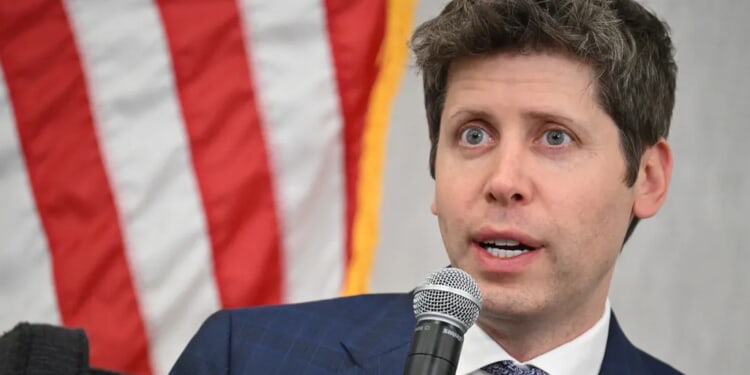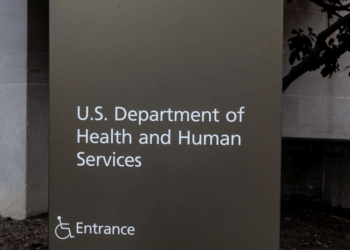AI behemoth OpenAI tried to lay the groundwork for a taxpayer-funded bailout Wednesday and was met with swift condemnation.
The Wall Street Journal published a story Sunday suggesting that OpenAI has now become “too big to fail.” In other words, if the company were to go under, it would be such a blow to the U.S. economy that the government would have to intervene and save it; otherwise, there might be a spiraling drain effect that sucks down the entire system. A domino effect from hell.
OpenAI’s CFO, Sarah Friar, seemed to test-pilot the idea at a Wall Street Journal conference Wednesday, saying that the company wants to build up an ecosystem of banks, private equity groups, and a federal government “backstop” or “guarantee” to help build and finance the crucial data centers. (RELATED: Battle Against Data Centers Driving Up Electric Bills Unites Republicans, Democrats)
There was swift backlash on social media, however, which forced OpenAI to do some cleanup. Friar later clarified her comment, saying that the mention of a “backdrop” muddied her point that “American strength in technology will come from building real industrial capacity which requires the private sector and government playing their part.”
OpenAI wants federal taxpayer backstop for new investments, per Bloomberg.
CFO has clarified this was a “misspeak.”
— unusual_whales (@unusual_whales) November 6, 2025
OpenAI CEO Sam Altman posted a long statement Thursday on X, claiming they are not looking for “government guarantees,” or a handout from Uncle Sam.
I would like to clarify a few things.
First, the obvious one: we do not have or want government guarantees for OpenAI datacenters. We believe that governments should not pick winners or losers, and that taxpayers should not bail out companies that make bad business decisions or…
— Sam Altman (@sama) November 6, 2025
“First, the obvious one: we do not have or want government guarantees for OpenAI datacenters. We believe that governments should not pick winners or losers, and that taxpayers should not bail out companies that make bad business decisions or otherwise lose in the market. If one company fails, other companies will do good work,” he said.
Sam just wrote a 1,500-word essay explaining why he absolutely doesn’t want government guarantees… while outlining a $1.4 trillion moonshot that somehow needs them in spirit, if not on paper. It’s performance art at this point. 😂
He’s basically saying:
“We don’t want…— Void Freud (@voidfreud) November 6, 2025
Altman went on to say that OpenAI has discussed government-subsidized loans to help build semiconductor factories in the U.S.
“The one area where we have discussed loan guarantees is as part of supporting the buildout of semiconductor fabs in the US, where we and other companies have responded to the government’s call and where we would be happy to help (though we did not formally apply),” Altman said.
“The basic idea there has been ensuring that the sourcing of the chip supply chain is as American as possible in order to bring jobs and industrialization back to the US, and to enhance the strategic position of the US with an independent supply chain, for the benefit of all American companies. This is of course different from governments guaranteeing private-benefit datacenter buildouts,” he goes on.
White House AI and Crypto Czar David Sacks joined the mop-up, as well. (Sacks is essentially Silicon Valley’s lobbying voice in the Trump White House.)
There will be no federal bailout for AI. The U.S. has at least 5 major frontier model companies. If one fails, others will take its place.
— David Sacks (@DavidSacks) November 6, 2025
But, if there were a real market meltdown soon, why should we take these people’s statements that they don’t want a guaranteed federal bailout as true at face value? Clearly, they have been mulling over the idea. And it would be much easier to finance a mass buildout of data centers if investors knew that the federal government and taxpayers would ultimately foot the bill. In other words, if they knew the risk and downside of the whole AI bubble blowing up in their faces was passed on to the public.
Altman recently got snappy when Brad Gerstner, an American investor, dared to ask him how OpenAI is going to pay for $1.4 trillion of long-term spending commitments on hardware and data center infrastructure from 2025-2035, even though the company’s revenue still is middling.
“First of all. We’re doing well more revenue than that. Second of all, Brad, if you want to sell your shares, I’ll find you a buyer. I just, enough. I think there’s a lot of people who would love to buy OpenAI shares. I think people who talk with a lot of breathless concern about our compute stuff or whatever, that would be thrilled to buy shares. So I think we could sell your shares or anybody else’s to some of the people who are making the most noise on Twitter about this very quickly. We do plan for revenue to grow steeply. Revenue is growing steeply,” Altman claimed.
Of course, the “people who are making the most noise on Twitter about this” just seem to be those with common sense, an ability to do basic math, and a growing skepticism that AI technology will actually be worth the investment. One MIT study found that 95% of organizations that have tried to implement generative AI, like OpenAI’s technology, ChatGPT, got zero in return. Another study from the Rand Corporation revealed that 80% of AI implementations fail.
All of it is beginning to reek of … ‘Just give me more money, and this time, there will be a major breakthrough, and it will all be worth it. The best is yet to come!’ I don’t know exactly how many times Altman and other tech CEOs have said something to this effect over the years, but I know it’s more than once.
And something of note: the famous investor who shorted the U.S. housing market ahead of the 08/09 financial crisis, Michael Burry, now has a short position on tech behemoths Palantir and Nvidia. He’s betting that these stocks are overvalued and will soon crash.
🚨 BREAKING: Michael Burry goes short on $PLTR and $NVDA in his latest 13F filing
Scion Capital just bought put options on 1M Nvidia shares and 5M Palantir shares 👀
The Big Short is feeling bearish on AI pic.twitter.com/Kn6EcINm20
— Michael Burry Stock Tracker ♟ (@burrytracker) November 3, 2025
News of the trade sparked a big selloff in tech, as speculation that AI is a bubble ready to burst is running rampant. That might explain why OpenAI tried to float the idea of the federal government and taxpayers funding their infrastructure.








![Florida Man Arrested, Said He Had a 'Dirty Bomb' in His Truck [WATCH]](https://www.right2024.com/wp-content/uploads/2025/12/Florida-Man-Arrested-Said-He-Had-a-Dirty-Bomb-in-350x250.jpg)
![Donald Trump Slams Chicago Leaders After Train Attack Leaves Woman Critically Burned [WATCH]](https://www.right2024.com/wp-content/uploads/2025/11/Trump-Torches-Powell-at-Investment-Forum-Presses-Scott-Bessent-to-350x250.jpg)







